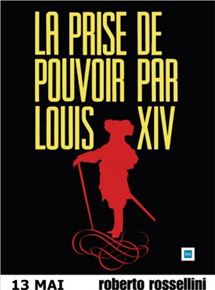The Taking of Power by Louis XIV
The Taking of Power by Louis XIV (French: La prise de pouvoir par Louis XIV), directed by Roberto Rossellini in 1966, is a landmark film in the genre of historical drama, focusing on the critical period when Louis XIV solidified his rule and laid the foundations for the Sun King's long and influential reign. This film is not only a significant work in Rossellini's illustrious career but also a pivotal piece in the portrayal of European history through cinema.
Plot[edit | edit source]
The film begins in the year 1661, following the death of Prime Minister Jules Mazarin, which marks the young King Louis XIV's decision to take personal control of the governance of France, refusing to appoint a new prime minister. The narrative delves into Louis XIV's strategic maneuvers to consolidate power, focusing on his interactions with the nobility, the implementation of absolute monarchy, and the initial steps towards establishing his court at Versailles. Through meticulous attention to historical detail, Rossellini presents a nuanced exploration of the king's political and personal challenges during this transformative period.
Production[edit | edit source]
Roberto Rossellini, a pioneer of Italian neorealism, took a distinctive approach to this historical subject, blending accuracy with a dramatic narrative. The film was originally made for French television, illustrating Rossellini's shift from cinematic releases to TV productions in the latter part of his career. This transition allowed him to explore historical narratives with greater depth and detail, a hallmark of his later work. The production is noted for its authentic costumes, settings, and use of natural light, which contribute to the film's immersive historical atmosphere.
Reception[edit | edit source]
Upon its release, The Taking of Power by Louis XIV was acclaimed for its innovative approach to historical drama, combining rigorous research with Rossellini's neorealistic style to create a vivid portrayal of the Sun King. Critics praised the film for its insightful look into the mechanisms of power and the complexities of Louis XIV's character. It has since been recognized as a seminal work in the historical film genre and a key example of Rossellini's genius in using cinema to explore the human condition within specific historical contexts.
Legacy[edit | edit source]
Rossellini's film has had a lasting impact on the portrayal of historical figures in cinema, influencing both filmmakers and historians with its methodical approach to storytelling and historical accuracy. It remains a critical resource for understanding the early reign of Louis XIV and the establishment of absolute monarchy in France. The film is also celebrated for its contribution to educational programming, serving as a valuable tool for teaching European history through the medium of film.
Search WikiMD
Ad.Tired of being Overweight? Try W8MD's physician weight loss program.
Semaglutide (Ozempic / Wegovy and Tirzepatide (Mounjaro / Zepbound) available.
Advertise on WikiMD
|
WikiMD's Wellness Encyclopedia |
| Let Food Be Thy Medicine Medicine Thy Food - Hippocrates |
Translate this page: - East Asian
中文,
日本,
한국어,
South Asian
हिन्दी,
தமிழ்,
తెలుగు,
Urdu,
ಕನ್ನಡ,
Southeast Asian
Indonesian,
Vietnamese,
Thai,
မြန်မာဘာသာ,
বাংলা
European
español,
Deutsch,
français,
Greek,
português do Brasil,
polski,
română,
русский,
Nederlands,
norsk,
svenska,
suomi,
Italian
Middle Eastern & African
عربى,
Turkish,
Persian,
Hebrew,
Afrikaans,
isiZulu,
Kiswahili,
Other
Bulgarian,
Hungarian,
Czech,
Swedish,
മലയാളം,
मराठी,
ਪੰਜਾਬੀ,
ગુજરાતી,
Portuguese,
Ukrainian
Medical Disclaimer: WikiMD is not a substitute for professional medical advice. The information on WikiMD is provided as an information resource only, may be incorrect, outdated or misleading, and is not to be used or relied on for any diagnostic or treatment purposes. Please consult your health care provider before making any healthcare decisions or for guidance about a specific medical condition. WikiMD expressly disclaims responsibility, and shall have no liability, for any damages, loss, injury, or liability whatsoever suffered as a result of your reliance on the information contained in this site. By visiting this site you agree to the foregoing terms and conditions, which may from time to time be changed or supplemented by WikiMD. If you do not agree to the foregoing terms and conditions, you should not enter or use this site. See full disclaimer.
Credits:Most images are courtesy of Wikimedia commons, and templates Wikipedia, licensed under CC BY SA or similar.
Contributors: Prab R. Tumpati, MD

